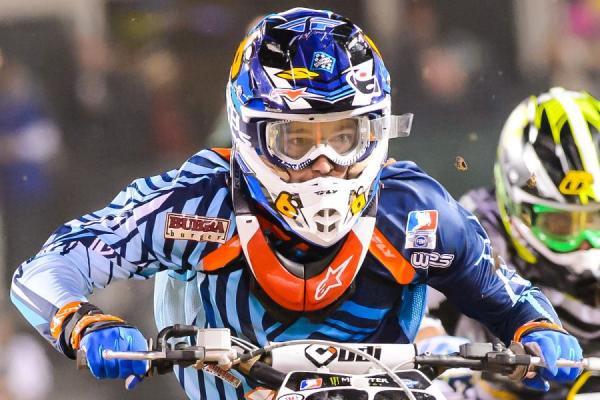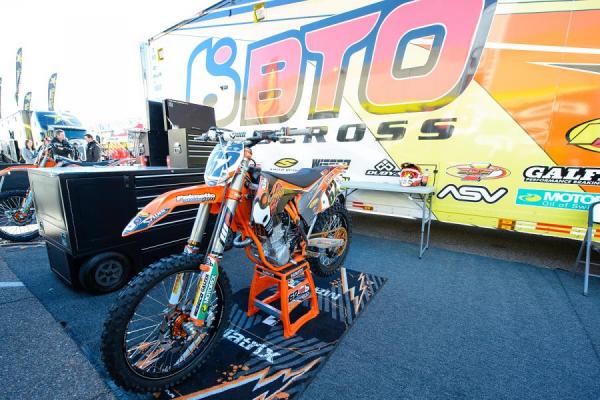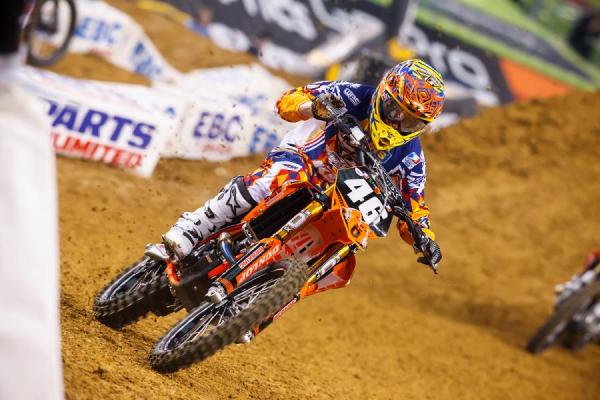Follow Andrew Short’s 2013 season, and you’ll follow tales of industry doom and gloom right over to a true bright spot. While team shutdowns for L&Mc Racing and Kranyak Racing left Short short on rides twice already this year, the team he will race for beginning this weekend, BTOSports.com KTM, is on the upswing.
BTOSports KTM is the evolution of Butler Brothers MX, and team co-owner and manager Forrest Butler points out that this year’s huge advances—factory KTM support, top-ten 450 SX finishes with Matt Goerke, and signing Short—are ten years in the making. Once just a team for the Butler brothers’ own racing exploits, the team has grown steadily, with a long term plan that’s just beginning to come to fruition. The team’s stable platform and growth have come from an idea counter to what you’d expect. The Butlers are obviously enthusiasts—they held pro licenses and lived the racer life for plenty of years. But they approached this as a business, first, and talk to Forrest Butler on the subject of owning and operating a race team, and you hear things that sound a whole lot more business than racing.
“From day one, when it was just my brothers and I, when we started this effort, it was all about trying to make enough money to cover the true expenses of going racing each weekend,” says Forrest. “I was a college kid, and I was a privateer racer, and I had a different goal in mind, and that was for all three of us to go racing. It was never about one of us, so the mind set never changed—it’s obviously a lot bigger now—but every relationship we’ve ever had since then, and our budget at the end of the year, it has to weigh out. You could explain it in 20 different ways, but the best way to say it is, there has to be a profit at the end of the year, and there always is, and I think that’s been the key to our success over the years.”

Matt Goerke has been solid for BTOSports.com KTM in his first season with the team, garnering multiple top-ten efforts.
Simon Cudby photo
“We kept the profit thing private for a long time,” he says. “You listen to everyone’s opinions when you started, and we all figured that if the sponsors knew we were making money from racing, maybe they wouldn’t want to spend it here. But it’s not a secret now—our partner, Vince [Arimitsu] from BTO, knows this. I’d rather lay it on the table for what it is. It’s a business, and me and my brother Karsten make our living from this. So who do you want to put your money with, someone who has this business as their number-one priority, or do you throw it at someone who does it as a hobby? Right now, all you hear is [motocross team] fold story after fold story, and we’re standing proof. I understand any business can fold, and there are some circumstances you can’t control, it’s not black and white like that for every team. But there are stories were teams went over budget, and that’s the demise of the team.”
Last week’s Redux focused on Team Rockstar Energy Racing, and team owner Bobby Hewitt credited staying within a budget and adjusting expectations accordingly as key to longevity. Butler feels the same way—and he puts in the work to make it happen.
“I don’t mean this to rub it in that we make a profit,” he says. “At the end of the day, we work hard. I’m the team owner and the team manager, and how many other teams do we see that have a team owner and a team manager? So, when I say I make a living, that’s also because I don’t pay someone to be the manager of the team. These other guys, they might be paying a manager as much as I’m making, so it’s not like we’re just stacking money into the bank—the money we make goes into the team.”
But how do they make money? This year, the team has finally gained that elusive factory support, with KTM taking a major interest in the operation. Each weekend, you’ll see Red Bull KTM heavies like Roger DeCoster and Ian Harrison checking in on the BTO operation, and we hear Goerke, for example, is running an engine almost identical to Ryan Dungey’s. But as we’ve learned the hard way over the last few years, industry support alone, even from a factory, isn’t a magic bullet. Funding from inside the industry hasn’t returned to pre-recession levels, and Davi Millsaps’ 450 success with Rockstar Energy Racing proves teams can succeed with or without the full-works treatment. For Forrest Butler, it’s the business end that makes his team work.

Bubba Burger signed on with the team this season.
Simon Cudby photo
“100 percent, we do everything on a business platform,” he says. “We file quarterly reports, we show what kind of sales gains we created, and the amount of return on investment we’ve created for each sponsor. We can do that just through a sales number with BTO, and that’s not even getting into the real reason anyone sponsors a team, which is exposure. So there are a lot of variables we can introduce to our sponsors.”
Gaining KTM support, and now a rider the caliber of Andrew Short, makes this a huge year in the evolution of this team. A subtler, behind-the-scenes tale might pay even bigger dividends, though.
Perhaps you remember the Langston-Witt or Ohlins racing team from 2012. The squad made a run at success with a professional-looking effort and the multi-time champion Grant Langston as team manager. The team was backed, financially, through Scott Witt, a motocross enthusiast, who has been very successful in his day job as Executive Vice President and Chief Financial Officer of Stellar, a design, engineering, construction and mechanical services firm based in Florida.But as soon as the 2012 season ended, word leaked out that Langston-Witt racing was no more.
“Team ownership wasn’t my cup of tea,” says Witt now. “Look at our results, we had a lot of DNFs, it just didn’t work out. It was fun, though, no regrets.”
But while Witt no longer wanted to own his own team, he was not planning on exiting the sport completely. Plus, he had already signed Les Smith to a 2013 deal. “I had a commitment to Les I wanted to honor and that by itself would have kept me connected [to the sport],” he says. “There were some other privateers I wanted to help. I didn’t think I was totally done, but at that point I didn’t expect to be affiliated to be with another team, either.”

The BTOSports.com KTM team will have another rider, Andrew Short, under the rig in Atlanta and beyond.
Simon Cudby photo
Forrest Butler approached Witt, but Witt was ready to rebuff his efforts. “When I shut down the team, he insisted on coming to meet with me,” says Witt. “And I told him, ‘You’re wasting your time, man. I’m on the sidelines.’” But he actually did some research on me and my company. I had a meeting with him, he heard what I wanted to accomplish, and he also knew I had to find something to help Les get through the season. So he came back with a proposal for how I could get involved with his team.”
Witt still employs a person full-time dedicated to finding outside sponsors for his motocross effort. He had some potential sponsors, and he felt that Butler’s understanding of business made the BTO platform a fit. Today, the relationship has already paid off, with Bubba Burger coming in with real outside money for the team. That sponsorship has created a real buzz in the pits. “We were already working on the Bubba Burger thing, for example, but it’s really a tribute to Forrest and how professional he is,” says Witt. “He understands how to translate it into my world, to have a professional package and have a professional conversation that just made me want to get involved.”
Witt sees a major gap in communication from motocross teams to corporate boardrooms, and that has been a major obstacle in finding outside funding. “There’s definitely money out there,” he says. “It’s a tough sell, but this sport offers a tremendous bargain for a corporate sponsor. They can get a lot more for a lot less here. The sport is small, but the demographic it covers makes it interesting to the right companies. The thing I see is, industry guys don’t know how to relate to corporate people. The way I look at it, you really have to go in and be an extension of that company’s marketing strategy and present it that way, and a lot of people don’t understand that, in my opinion.”
“Scott was the type of person that Vince and I were hoping to meet,” says Forrest Butler. “I think Scott wanted to be involved with someone like us who had a business structure. I think we have a long future together, because we were able to give him the value to do what he was looking to do, and obviously Scott brings in that corporate value, outside the industry, with Bubba Burger and a lot of other potential stuff we’re working on for the future, with Vince and I. Because you can only go so far with industry money.”

Les Smith rode for the Langston-Witt team last season, and is now under the BTOSports.com tent in 2013.
Simon Cudby photo
But don’t think for a second that Forrest Butler wants to join the list of those punching holes in the current motocross economic equation. He’s quite happy where the sport has gone, and where it’s going. “I get upset with the articles and interviews. I don’t understand the MO with people basically bashing on our industry,” he says. “If you show up at a supercross right now, I can’t say we’re anything but proud of what is there. Today, the only challenge is getting that corporate guy to make it to the race. Once you get them there, and you make sure your team presentation is good, and hopefully your team results are good, beyond that you have nothing to worry about. Because what Feld has done, it’s amazing in my opinion. I have people coming to the race this weekend in Atlanta who have never been to one before, and I’m already excited, because I know the show is so cool that they’re going to have goose bumps after opening ceremonies.”
The Butler brothers have stuck with their plan and stuck with the sport, and now they’re in position to reap the benefits—the early season results from Goerke have been spectacular, and they’re now positioned for even better. Witt, meanwhile, could have abandoned racing altogether, but he says that idea never crossed his mind. It’s partially because the sport offers real potential from the business side—but also because, deep down, both just love the sport.
“I was never fed up with the sport,” says Witt, who started racing motocross himself at age six. “I love being at the races and being around it.”And as much of a businessman as Forrest Butler has become, he’s still a racer himself, at heart. “I don’t pay a manager to manage this, because I love it,” he says. “Back in the off-season, I was staying at Goerke’s house every two to three weeks. We don’t have a team trainer or a team coach. My brother and I are very close to the riders. I don’t see that changing now or in the foreseeable future, because we love it.”




